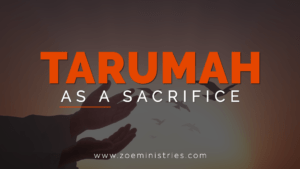TÂRUMAH AS A SACRIFICE
The heave-offering or the târumah offering is found in the Old Testament. Practicing the giving of the târumah is a spiritual exercise that trains our hearts and minds to keep an altar for the Lord. We are to set apart the târumah offering and to give it generously. The Lord is a holy God and this practice is our declaration of our obedience and trust in the Lord.
Numbers 5:9
According to Numbers 5:9, “All the sacred gifts the Israelites bring to a priest will belong to him.” Exodus 23:19 tells us, “The choice first fruits of your soil you shall bring to the house of the Lord your God.” The heave-offering belongs to the priest.
In Numbers 5:9, the term “gifts” here is directly translated as the târumah.
Gifts are made “sacred,” not because one brings them to the priest. Instead, the gift is sacred because the giver sets it apart from his income.
Gifts are made “sacred,” not because one brings them to the priest. Instead, the gift is sacred because the giver sets it apart from his income. The first fruits of the income are set apart as tithes and offerings, as well as târumah or heave offering. The act of separating the first fruits makes the entire income holy because the giver is declaring that God is the source of the entire provision. Even when the giver is sacrificing only a portion of the income, the Lord can bless the whole lot, depending on the attitude of the giver’s heart.
Deuteronomy 12:6: In the passage below, we see that the târumah or the “special gifts” is different from the tithe.
The passage said bring your special gifts and a tenth of everything you produce. If it were the same, it would have said special gifts or a tenth of everything you produce. Thus, they are different offerings that are commanded of the people.
6 Take your burnt offerings and sacrifices to that place. Bring your special gifts and a tenth of everything you produce. Take with you what you have promised to give. Bring any other offerings you choose to give. And bring the male animals among your livestock that were born first to their mothers. (Deuteronomy 12:6, emphasis added)
Where you are right now, if you have peace in your heart about the local church you belong to, then this is the place God chose you to worship, and you must bring the offering here.
Different kinds of offerings are brought to God’s chosen place of worship. The Lord specifically guides the believers as to where they are to bring the offering. Where you are right now, if you have peace in your heart about the local church you belong to, then this is the place God chose you to worship, and you must bring the offering here. The people are called to sacrifice and to offer it unto the Lord as worship.
Deuteronomy 12:6 is followed by verse 7, which is a verse that speaks of joy:
7 You and your families will eat at the place the Lord your God will choose. He will be with you there. You will find joy in everything you have done. That’s because he has blessed you. (Deuteronomy 12:7)
Giving results in joy, not in sorrow, in the Christian life.
Out of the people’s obedience, there is a joy as a result of blessings. Joy is underlined by the fact that it appeared twice in the chapter accompanying sacrifices and offerings (Dt. 12:12; 18). Giving results in joy, not in sorrow, in the Christian life. We go back to how Paul related generosity with an attitude of cheerfulness:
7 Each of you should give what you have decided in your heart to give. You shouldn’t give if you don’t want to. You shouldn’t give because you are forced to. God loves a cheerful giver. (2 Corinthians 9:7)
As a people, may we find joy in giving? Our offering to the Lord is not another bill to pay. It is an opportunity to express our true devotion to the Lord. It is a declaration that we treasure our relationship with God more than we treasure our earthly wealth. Moreover, it is an opportunity to experience the blessings and faithfulness of the Lord, as a direct outcome of our obedience.
There is joy when you experience the communal nature of worship life with a local church. It is important to rediscover the joy of community worship, making offerings to the Lord as God’s people. It’s one thing to be called to give individually, but to live together as a church is a whole different experience of communal worship. The early church love feasts. It is after they give their offerings as a community that they also have celebrations as a community.
It’s one thing to be called to give individually, but to live together as a church is a whole different experience of communal worship.
Your weekly dose of prophetic wisdom and anointing awaits you. Join our LIVE Conference Call!
1) Call 515-604-9266
2) Go to startmeeting.com, and use the login: BishopJordan












This is one awesome blog post.Much thanks again. Keep writing.
I am so grateful for your article.Thanks Again. Cool.
Muchos Gracias for your article. Cool.
Muchos Gracias for your post.Much thanks again. Fantastic.
I truly appreciate this blog.Really looking forward to read more. Great.